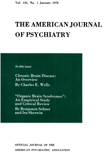The Pueblo Incident: Psychological Reactions to the Stresses of Imprisonment and Repatriation
Abstract
The 82 surviving crew members of the U.S.S. Pueblo were evaluated psychiatrically 48 to 72 hours after their release from North Korea. Slightly more than half the crew admitted to experiencing significant anxiety or depression during captivity. Factors associated with poorer adjustment included immaturity, passive-dependency, and obsessive-compulsiveness. Those with schizoid personalities tolerated the imprisonment well. Previous descriptions of a repatriation syndrome in prisoners of war, consisting of initial apathy followed by anger and hostility. were confirmed.
Access content
To read the fulltext, please use one of the options below to sign in or purchase access.- Personal login
- Institutional Login
- Sign in via OpenAthens
- Register for access
-
Please login/register if you wish to pair your device and check access availability.
Not a subscriber?
PsychiatryOnline subscription options offer access to the DSM-5 library, books, journals, CME, and patient resources. This all-in-one virtual library provides psychiatrists and mental health professionals with key resources for diagnosis, treatment, research, and professional development.
Need more help? PsychiatryOnline Customer Service may be reached by emailing [email protected] or by calling 800-368-5777 (in the U.S.) or 703-907-7322 (outside the U.S.).



